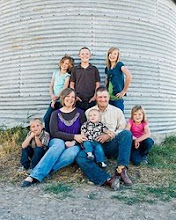Farm Bureau Aims to Kill Climate Bill
By Kate Galbraith
American Farm Bureau The American Farm Bureau, a large agricultural lobby, is gearing up a campaign to defeat climate legislation now pending in Congress.
The politically influential American Farm Bureau, the self-described “national voice of agriculture,” has outlined a new campaign effort to derail Congressional bills to combat climate change.
In a memo obtained Wednesday by Green Inc. and addressed to state farm bureau directors, the group’s public-relations director, Don Lipton, wrote:
Climate change bills in both the Senate and House will impact our farmers and ranchers, hit America’s consumers and impair the economy of our nation. For farmers and ranchers, it will mean higher fuel and fertilizer costs, which puts us at a competitive disadvantage in international markets with other countries that do not have similar carbon emission restrictions. For the future prosperity of the U.S. economy and American agriculture, climate change legislation must be defeated by Congress.
The authenticity of the memo was confirmed by Cody Lyon, the American Farm Bureau Federation’s director of grassroots and political advocacy.
The campaign’s slogan will be “Don’t CAP Our Future” — a play on the baseball-style caps often worn by farmers. According to the memo, state farm bureaus will get a campaign “starter kit” — including themed stickers — by early next month.
The memo urges members to place a “Don’t CAP Our Future” sticker on a farmer’s cap, sign either the sticker or the cap, and hand-deliver it to a local office of the United States Senate.
“The timing is very beneficial as many state Farm Bureau annual meetings are right around the corner,” the memo says.
Other suggested tactics include: sending messages to Senate offices; an online petition; a large banner and booths at the annual state farm bureau meetings; passing a resolution against the climate bills at state meetings; and writing opinion articles for local papers.
The American Farm Bureau’s position puts it at odds with the Secretary of Agriculture, Tom Vilsack, who has argued that the costs of cap-and-trade to farmers will be outweighed by the benefits — from carbon offset revenues, for example.
The farm bureau has also recently campaigned against the possibility of a “cow tax” on methane emissions, which the Environmental Protection Agency has not proposed to do.
Cap and trade will harm all farms, not just the so called 'factory farms". As the owner of a small family dairy farm I understand that the current cap and trade legislation would most likely force my family out of business. If we run farms out of the US, the millions of people who depend on American farmers for food, will be forced to get food grown in other countries, countries that do not meet the rigorous environmental standards we as American farmers meet. The end result will be to increase, not decrease the "carbon footprint" of the food we eat.
I applaud the Farm Bureau for standing up and fighting for all US farms. Cap and trade is not only bad for farmers, it is bad for our environment and bad for America.
christmas 2013
12 years ago
